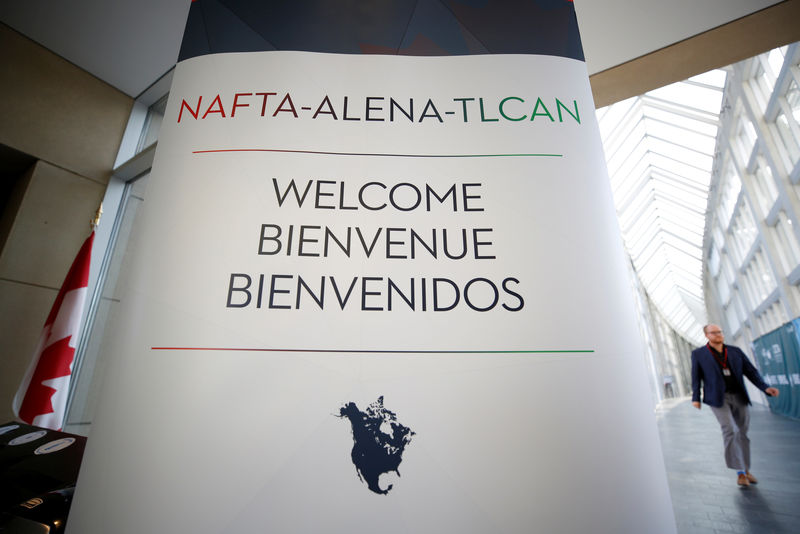(Bloomberg) -- It wasn’t supposed to be like this, but the folks who help U.S. companies set up production in Mexico say they’re having a solid year.
Tecma Group has more business than ever in its three decades doing relocation. In just the last few weeks, it aided a maker of cleaning equipment and a packaging company make the move south. Chicago-based Mexico Consulting Associates has three new prospects interested in Mexico. Keith Patridge, who runs McAllen Economic Development Corp., expects at least 12 companies to set up shop in Reynosa alone this year. And another firm, Tacna Services Inc., has assisted two businesses locate in the Baja California area.
President Donald Trump’s vow to scrap or revamp the North American Free Trade Agreement was expected to put a scare into companies considering these kinds of moves. But many are sticking to plans to set up shop in Mexico even if the pact isn’t renewed, according to the experts who help firms relocate and find new plants.
Lots of factors go into the decisions but these companies have made a simple calculation: Cheap labor in Mexico -- as much as a $20,000 saving per worker compared with the U.S. -- is enough to offset the higher costs of any tariff imposed by Nafta’s demise. That math shows how Trump’s America First effort to revive manufacturing faces hurdles.
“If they just wiped out Nafta and went back to normal trade tariffs, I think that’s manageable,” said Ross Baldwin, chief executive officer of Tacna. “Life would continue on because the labor rate is so dramatically different.”
Drastic Consequences
The latest rounds of talks over the 23-year-old trade treaty ended last week, with Mexico and Canada rejecting hard-line U.S. proposals. Negotiations will resume in November but the ministers agreed to put off any resolution until next year.
To be sure, some economists predict a less rosy outcome than do the relocation firms, who have reason to put a gloss on their business. Economists point to studies warning of drastic consequences if the accord is ended -- a loss of more than 250,000 jobs in the U.S. and almost 1 million in Mexico, which has been deeply transformed by Nafta. Trade with the U.S. exploded to $524 billion last year from $82 billion in 1993, the year before the pact took effect.
After his election, Trump used the bully pulpit to shame executives who intended to move manufacturing to Mexico. The campaign worked for a few months as some companies froze their Mexico plans. But the flow of jobs south resumed earlier this year as they weighed the cost advantages.
Under Nafta, the three countries pay nothing on almost all goods that cross their borders. But if Trump decides to kill the agreement, trade would be subject to tariff limits set by the World Trade Organization. On average they are less than 3.5 percent for Mexico and about 7 percent for the U.S., said Benito Berber, a senior economist for Latin America at Nomura Holdings Inc.
Wage Gap
Many companies may just swallow those costs because of the wage gap. A starting salary for a Tijuana factory worker, including benefits, is the equivalent of about $2.50 an hour, according to Baldwin. The average hourly wage for U.S. assemblers is $14.93 and the lowest paid 10 percent of the group earns $9.24 an hour, Bureau of Labor Statistics data show.
Plus, Mexico’s labor costs have barely changed over the last couple decades, while China’s -- a rival to woo manufacturing jobs -- have steadily risen.
Intermex Industrial Parks, which provides real estate and services for factories, boasts on its website that U.S. corporations can save $20,000 annually per worker, and touts Mexico as “among the best in labor stability.”
Kongsberg Automotive, an auto-parts maker, is taking advantage of the differential. Early next year, it’s closing a factory in Easley, South Carolina, that makes hose and tubes and moving production to Mexico, the Norwegian company said in August. The factory employs 97 workers.
“There is a strong need to become more efficient and reduce costs, which can only be achieved by relocating the Easley manufacturing operations,” Kongsberg said.
Medical Devices
Halyard Health Inc. is closing a plant in Buffalo Grove, Illinois, that makes medical devices and is moving part of the operations to Mexico, according to federal filings. Layoffs of the 85 workers there began at the end of September. Halyard has factories in at least four Mexican cities, according to a company filing. A spokesman didn’t respond to a request for comment.
All this has even the relocation experts admitting to some surprise over the strength of their business.
“Actually, demand has probably grown slightly and the conditions right now in Mexico are actually pretty good,” said Gene Reilly, chief of the Americas for Prologis, a developer of industrial real estate with operations in Mexico.
